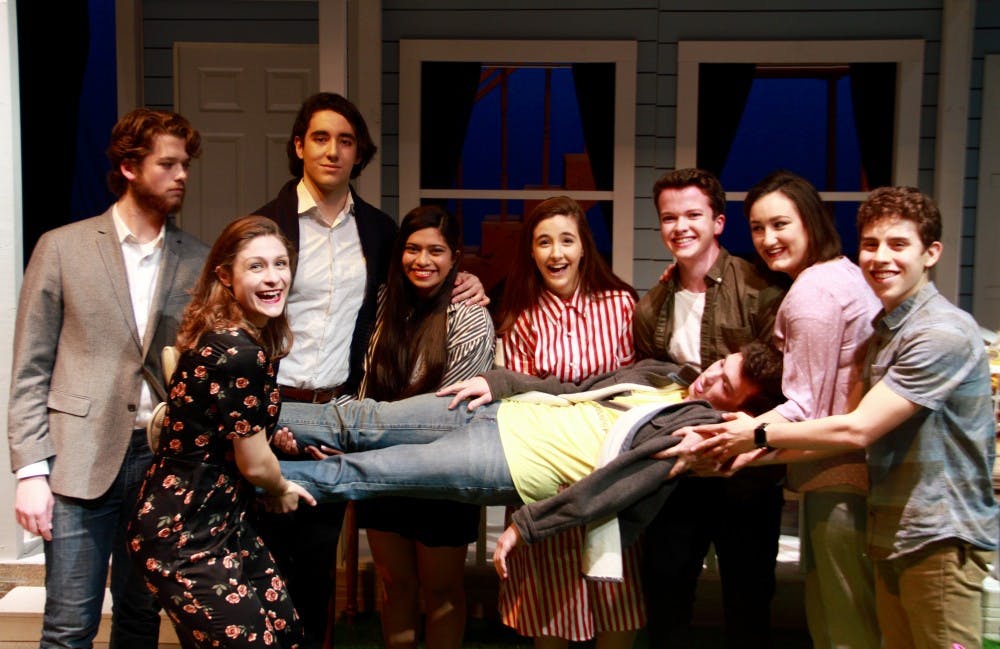Witness Theater presented their Intersession showcase, Welcome to Our House — produced by junior Sarah Linton and stage managed by freshman Dominique Dickey — in the Mattin Center’s Swirnow Theater this weekend. The show featured a diverse collection of four student-directed and written one-act plays.
Technical Director senior Ryan Kunzer discussed what distinguished the set from its previous counterparts.
“It’s definitely been the largest production we’ve done,” Kunzer said. “Usually it’s a one-story, indoor-set, but this time we were ambitious and built a two-story house and a big treehouse. There was a lot more structural stuff than what you see in most plays.”
“The Safest Place in the Whole Wide World,” written by seniors Pepe Muñiz and Erin Todaro and directed by the former, begins with Ethan (freshman Owen Campbell) climbing into the treehouse, just as homemaker Rose (senior Sharon Maguire) exits the house and puts the finishing touches on her yard sale.
While Rose and hilariously chirpy piemaker Cheryl (senior Elizabeth Winkelhoff) are inside, Ethan overhears new neighbors Riley (sophomore Fionn Connolly) and Blaine (junior Matt Mullner) reveal that they are the murderers of an ongoing investigation. Rose refuses to listen to Ethan’s recounting, focused on her sale. Although initially unwelcoming to the couple, she puts her homophobia aside when their teapot completes her teacup collection.
Muñiz discussed the sense of accomplishment that “The Safest Place in the Whole Wide World” provided him.
“To see your writing come to life onstage is a rewarding thing,” he said. “It’s a lot of fun to create these characters in your head and... then see the actors make them their own, inevitably something entirely different. It’s always a really fun process to... rediscover these characters through the eyes of someone else.”
He added that the audience should note the kite. Indeed, Ethan points at it before hiding in the treehouse; it seems to serve as the elephant in the room — a skeleton half-in the closet — that Rose does not want to fully address: that the couple are murderers.
Rose goes so far as to suggest that the murder weapon could have been the teapot after the sheriff (freshman Jonah Facciolli) notes that it was likely a round object. After he leaves, Rose scrubs the teapot, destroying any evidence and not wanting to know the details. She ushers the couple into her facade; everyone has their secrets in Palmdale.
The kite carried similar symbolism in the second play “Lift and Drag,” written by Linton and directed by junior Sarina Redzinski, which starts with Ria (senior Lily Kairis) attempting to remove it from the tree. She tells her boyfriend Jason (sophomore Enrique Oliva) that his estranged sister Antonia (sophomore Maya Singh Sharkey) has messaged her, but he ignores her, choosing to focus on the kite; it’s a distraction from a deeper issue.
While Ria is off-stage, Antonia arrives and confronts her brother for ignoring her. She explains that she is seeking his permission to publish an essay about them and their father, who is later revealed to be abusive.
After Jason reads Antonia’s essay, the two are finally able to discuss their troubled past. They work through what tore the two siblings, who once read together, apart, their fears and their motivations.
He does not want to wear his abuse like “a fucking Girl Scout badge,” but she says that it doesn’t look bad, comparing it to a “kite stuck in a tree.”
Jason welcomes his sister back into his life and decides that the three of them will go to the store, buy a ladder and truly tackle the issue of the kite right then and there. He assumes agency over his abuse.
Singh Sharkey shared her thoughts on the nature of Witness Theater’s content.
“You’re originating a role,” she said. “There’s no precedent; there’s no one you can look back [on] and say, ‘Oh, these are choices that have been made’... because this is the first time it’s out in front of an audience.”
The dialogue throughout the play functioned to address a sensitive topic in a tactful, yet moving, manner. It captured the often self-contradictory sentiments that both Jason and Antonia experienced.
The third play “A Typical Day in Suburbia,” written by junior Anita Louie and directed by graduate student Christy Lee, similarly highlighted the self-contradictory nature of humankind, an object of fascination for an alien scientist (senior Allie Zito). Misanthropic Human #1 (senior Ian Stark) is disheartened to hear that he is not missed on Earth, yet he claims not to subscribe to romanticism.
The alien scientist has created an extraterrestrial simulation of a suburban home, that which she and a hilariously robot-like android (freshman Aidan Smith) discuss in vivid detail. Their conversation serves to ridicule the idyll of a classicist, dehumanizing suburbia, where all houses are identical.
Human #1 points out that behind the veneer of DIY garden gnomes are racism and homophobia. He feels trapped and powerless; he counts the days as would a prisoner and involuntarily sings along to The Killers’ “Mr. Brightside.”
The alien scientist and android introduce him to Human #2 (sophomore Gemma Simoes deCarvalho), who artfully mocks his seemingly quotidian heartbreak, that which he describes poetically.
His heartbreak is nothing particularly tragic, yet holding onto it permits Human #1 to reclaim his free will, his humanity. He convinces her to help him kill the alien scientist and the android, and they overcome the microcosm of suburbia.
Murder and individuality signify the opposite in the final play “A Writer’s Retreat,” written and directed by senior Renee Scavone. College friends Shay (senior Brian J. McConnell), Lux (freshman Sophia Triantis), Christianne (sophomore Nayanika Iyer), aspiring politician Teddy (senior Mehdi El-Hebil) and writer Basil (Sam Schatmeyer) reunite for a garden party, along with Lux’s friend Marco (sophomore Fionn Connolly). The morning after, they discover that Shay is dead.
Replete with allusions to Fyodor Dostoyevsky’s Crime and Punishment, their dialogue is remarkably well-wrought; they turn against each other and make contemptuous comments and jokes at each other’s expenses. The murder erodes their empathy and emphasizes their concern for their self-interests.
In juxtaposition, Basil’s agent Harriet (junior Caroline Halligan), an emotive outsider, seems to be the only one who cares that a man is dead. Basil reveals that he killed Shay in an attempt to understand the experience of committing the crime but claims to feel nothing, which ultimately drives him to suicide at the end of the play.
In charge of Lighting Design was sophomore Brandon Lax. All four plays made adroit use of the set, light and sound to enhance their plots and themes.
“I love doing Witness because it’s a lot of different things you don’t get to do anywhere else,” Kunzer said. “No other theater company would let us pick the set and then have the writers write something for it.”
Muñiz commented that the plays, though diverse, were united by the shared set.
“The plays are entirely different, but because they’re in the same space and because there are elements that overlap between them, it gives the show a sense of continuity,” he said. “At the end of the day, you get the sense they were all somehow connected... because we workshop the plays together. I think being a single cohesive showcase is something unique to Witness Theater.”





